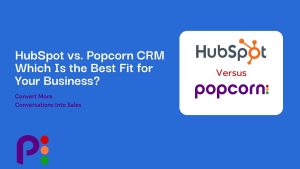Introduction
Anyone who owns, manages or works for a company knows that its successes come from the people behind it. Like sailors on the seven seas, everyone’s role is dependent on one another, helping to chart a course through the sometimes choppy waters of running a business.
Of course, for this to happen, everyone has to be able to work together. Otherwise, things can get sour, quickly. A whole boat can sink from disrepair or disuse; but if the situation is turned around, you can sail faster than ever before.
In amongst this, the morale of your sailors is what holds things together, but they can’t keep it up on their own. Ease of access, communication, clarity and task management all help people to do their jobs, and foster a calmer, more productive environment that everyone can be eager to contribute to.
There are many ways that this can be achieved, with endless software and services on offer that aim to improve productivity. This is especially the purpose of CRMs—Customer Relationship Systems; at their core, they are there to make the entire sales process easier. They join up data that exists in multiple places; they make your sales pipelines accessible; they show you the links between what your contact is doing and how to capitalise on that. This obviously has its benefits on an individual level, whether you are an entrepreneur or an employee in a sales team, but the effect of adopting one that works for your company is business-wide.
1. Join Up Data to Improve Productivity
Because CRMs put everything together in one place, it makes your data accessible and visual. Information connected to a contact that may be useful later doesn’t get lost in a sea of notes; if the contact is there, you can see it and you can even set a reminder so that you don’t forget it. CRMs such as popcorn make the contact’s profile information accessible from everywhere, too, so you can bring up important notes simply at the click of a button.
Being able to visualise your sales pipelines to see exactly what is going on is another huge benefit of CRMs. Instead of picturing at which stage each prospect is in your head, you get a reflection of real life that is easier to understand and keep track of. Dragging and dropping contacts through your sales pipelines, something you can do in popcorn, reflects the journey you need to guide your prospects on.
Having clarity can maximise productivity, as time is not wasted on trying to search for or understand irrelevant information. In turn, this has a positive effect on the relationships between those involved in sales; with ease of use aiding productivity, goals are met, plans are easier to understand, and less time wasted means more success shared. That can be a great feeling for employees, and if they’ve worked together, that feeling of accomplishment will spread.

2. Improve Productivity with Successful Task Management
Managing a business or a team requires discipline for achieving the necessary tasks, and nurturing prospects is no exception. This is even more so the case for small businesses, who have plenty of tasks but less resources or people to do it. Whereas decentralised information would allow tasks to get left behind and buried underneath piles of other stuff, CRMs provide a real-life display of the effect of leaving a task behind. This goes for team members, too; if they haven’t followed through with a task they were set—for example, phoning a prospect at a certain time—this is visually realised in the CRM. If this happens, your team can be encouraged to pitch in, to plug the gap.
After all, understanding the sales process makes the work smoother, and your goals easier to achieve. Automation, also, helps smooth this process, as your team are not getting bogged down by repetitive, manual tasks that take time away from nurturing your prospects. Because you can focus on the prospect, not the process, deadlines are achieved and your prospects are managed more expertly.
3. Communicate Efficiently, Improve Productivity
Being clued in on exactly what’s going on cuts out half the job of communicating with your colleagues—what’s the point in asking for information that you can already see?
Having everyone on the same page prevents that delay in communication. Overstepping, or unnecessarily duplicating tasks, is much reduced, which means a calmer environment in which to work. Productive collaboration, to truly make the most of a prospect, is encouraged too, with reporting also easier to access after your marketing campaigns.
Communication is improved not just between your colleagues, but with your prospects too. This is especially true if you have in-built marketing tools, like popcorn does with its email marketing campaigns and landing page creators. The information that gets pulled from the CRM can inform and refine your marketing, in turn building a stronger relationship with those prospects. Those who need to access the results from this marketing are able to do so quickly and easily within the software, speeding along the process of reporting and discussing next steps. Having this information easily to hand encourages a snappier pace of productivity, which will billow out and influence other colleagues.
4. Boost Motivation, Improve Productivity
Having everything in front of you sound like it is overwhelming, but the way CRMs are set up—particularly popcorn—gives you the power to focus your attention on what matters. This, again, is achieved through the sales pipelines, where you can see with your own eyes at which stage of your sales process your prospects are at, and therefore how much they need to be nurtured by your company. This is because you are able to see the bigger picture, so you can focus in on what’s actually important for right now and for in the future. You don’t lose time trying to retrace your steps! Reminders also help to achieve this, by making sure you don’t forget any prospect or their engagement.
There is a boost of motivation that comes with knowing what you need to do, without unnecessary distractions getting in the way of your goal. With productivity increased, this can inspire those around you with their own work. This, combined with the good communication mentioned earlier, can have a positive effect on the team.

5. What Happens If My Team Don’t Want to Use a CRM?
If your team aren’t taking to a CRM properly—for example, only using a select few feature or ignoring it entirely—it could be because it’s not the right fit for your small business.
The truth of the matter is, there are many CRMs out there, and some are more suited to particular types of business. Taking the time to research about the different CRMs available can help to prevent the above scenario before you spend time and money integrating it into your business.
Take popcorn, for example. The idea from the very start was to make it simple and effective. What this means is that small businesses don’t find it using it time-consuming, which often puts off team members and small business owners from using the CRMs they have. But because popcorn has the essential tools small businesses use, every part will have its use—preventing your team from switching off when using it, and maximising productivity at the same time.
Companies need a sense of collaboration and clarity in order to make the ship run the way it should. CRMs provide just that, by visualising the tasks being talked about, and offer direction, opportunities you otherwise would have missed, and a sense of achievement. With morale being such an important aspect of people working together, CRMs are then vital to hoist up the masts, steady the ship, and sail plainly with the world behind you.
Enjoyed this post? Comment below or read through our blog for more lead management and CRM tips, especially for small businesses.











